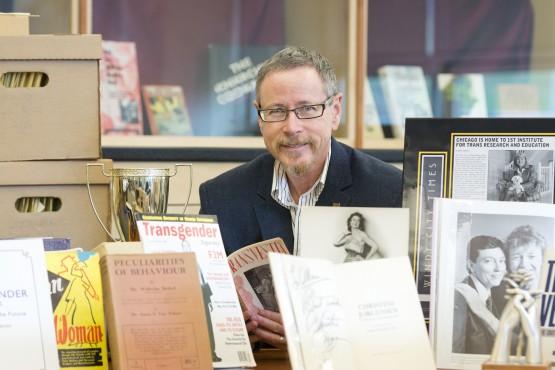
Aaron H. Devor, shown here with research materials kept in the Transgender Archives, will serve as the newly established Chair of Transgender Studies at UVic. Photo provided by University of Victoria
On Jan.15, UVic announced Sociology professor and Transgender Archives Founder and Academic Director Aaron H. Devor as the world’s first Chair of Transgender Studies — a monumental appointment.
As Chair, Devor will help to push for better policies regarding trans people by “consulting with various bodies outside of academia.” He plans to translate research he conducts himself, or assists with, from academia to the real world, and sponsor events that spread trans knowledge — events which include conferences, lectures, films, arts, and dance events. Devor will also act as a public figure with whom the trans community, both locally and abroad, can speak and voice their concerns.
The position emerged largely from the efforts of Devor himself. As a gender non-conforming person, he has always been interested in gender. “I saw the need for [the position],” he said. “I set out to make it happen . . . [and put] a proposal before the Senate and the Board of Governors.”
[pullquote] “I’m kind of in awe . . . I’ve been given a tremendous honour, and a huge responsibility and I hope that I can live up to it.”[/pullquote]
Devor said that UVic proved to be very welcoming and supportive of the proposal for a new Chair, and he faced no trouble while trying to establish this position. “When [the proposal] came before the Senate [on Oct. 2 last year] . . . the vote went through unanimously in support. And there was a very big round of applause, followed by [President Jamie Cassels] making some lovely comments . . . You couldn’t get a better experience.”
In the ‘80s, however, when Devor was just starting his research in what we now call Transgender Studies, things weren’t so simple. “We didn’t have the word ‘transgender’ in the regular vocabulary,” he said. “We certainly didn’t have anything called ‘Transgender Studies.’”
His first book, Gender Blending: Confronting the Limits of Duality, challenged the gender dichotomy. Published in 1989, it was a compilation of the experiences of 15 women who were regularly mistaken for men. The book was a glimpse into the social constructions and meanings of gender in North American society and its influence on daily lives.
Devor answered many questions people still had regarding trans people in 1997 with the publication of his second book, FTM—Female to Male Transsexuals in Society. Through interviews with 45 trans men, Devor dealt with questions of identity, the transitioning process, and its implications for both trans men and society. He also explored how the participants chose to identify themselves in relation to their childhood experiences and in their adult lives with their friends, families, partners, and peers.
In the early 2000s, Devor realized that he identified as a trans person, and underwent his own transition. He remarked, however, that it’s much less isolating to be a trans person today than it was 30 years ago, attributing social progress to efforts of many activists and accelerated by the rise of the internet and social media:
“Prior to the internet [and] social media, people had a very hard time finding each other and the only people who had a public voice were people who owned the mass media,” said Devor. Now, he said, people don’t need to rely on mass media outlets to tell their stories — they have their own voice on a grand scale.
And although Devor recognizes that social change was, is, and will be incremental, “most people are influenced by personal stories, [and] as more and more trans people have felt safe enough and brave enough to come out . . . more people around them know someone personally who is trans. And so it’s much harder to hate and demean and hold stereotypes about people that you actually know and have relationships with.”
In addition to researching and sponsoring events as Chair, Devor will continue to add to the ever-growing Transgender Archives at UVic, and assist in creating scholarships for undergraduate and graduate students. He will also help professors who want to add more trans content in their courses, and teach courses on trans subjects himself.
Devor commented that he felt amazing about his inauguration as the new Chair, but also a little overwhelmed.
“I’m kind of in awe . . . I’ve been given a tremendous honour, and a huge responsibility and I hope that I can live up to it.”







